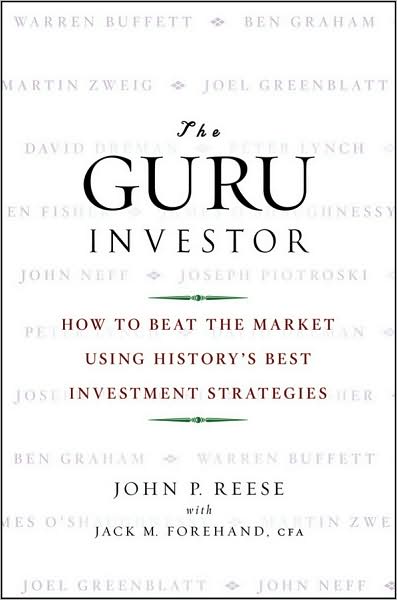John Reese and I share something in common: we both once wrote for RealMoney.com.? Occasionally I would question him in? the CC about what he wrote, but I never got an answer back.? He was probably a busy man.
Well, now I get to review his book, and I have to say that I like it.? It won’t be one of my favorite investment books, but it embeds many good ideas that will be useful to average investors.? Here are some of the main advantages:
1) It points people toward strategies that are valuation-conscious.? Whether investing for growth or value, the best investors pay attention to valuation.
2) Valuation is not everything.? Earnings growth and price momentum also are valuable to follow.
3)? Quality of the balance sheet matters.
One of the things that I like to say to investors is find something that fits your character, your free time, and your time horizon.?? This book simplifies the strategies of ten clever investors.? Some require more time and effort, some less.? With ten good strategies to choose from, perhaps one will fit your situation well.
For the ten gurus, it describes them, their strategies, and how to implement them in a simplified way.? I knew a little about all of the gurus before reading the book, but I learned a little bit new about each one, except Buffett.? They made life choices that led them to their investment theories, and the book makes that connection.
Sell Discipline
The sell disciplines in the book are similar to mine — rebalancing, and adding stocks that the model likes better, and removing those that rank lower.? For fundamental investors, that’s a reasonable way of limiting risk, assuming that you review your thesis before adding new money.
Quibbles
1)? Earnings quality: leaving aside Piotorski, the rest of the gurus spend little time on earnings quality.? Particularly for value investors this component is critical for avoiding mistakes.
2)? What Reese puts forth is a simplified version of what most of these great investors do.? The actual process is more complex, and requires business judgment.? That said, his simplifed versions have done better than the market, in general.
3)? Performance calculations cut off in July 2008.? Now, he had to cut off somewhere, or he couldn’t publish.? Still, it would be interesting to know how the strategies did July 2008 through February 2009 — how did they do at risk control?
4) To be able to use this book effectively, you would need to have access to some reasonably sophisticated stock screening software.? The cheapest one that I know of would come from AAII, but you would also have to be an AAII member to buy it.? (If anyone knows a better one at a cheaper price, let me know.)
Who Would Benefit From this Book
This book would work best for people who want to follow valuation-conscious strategies, and not spend a ton of time at it, if they are willing to put in some time at the beginning setting up stock screens.
Summary
If after you have read this, you want to buy the book, you can buy it here — The Guru Investor: How to Beat the Market Using History’s Best Investment Strategies.
Full disclosure: I get a small commission from Amazon on anything that gets bought after entering Amazon through my site.? Your price doesn’t go up, and Amazon is always happy to have additional sales, even at a lower gross margin.


Thanks for that mention of the AAII screening program. I’d find it interesting if you evaluated some of the commercial stock screening tools available to the individual investor. I considered several a few years ago and came away disappointed that I couldn’t even duplicate fairly simple valuation measures, for example those in Greenblatt’s magic formula.